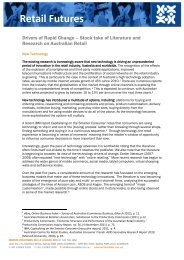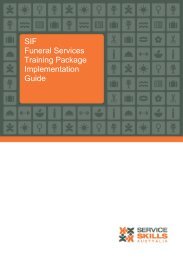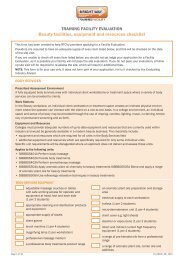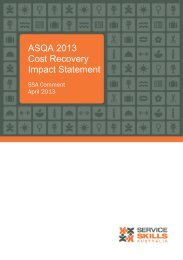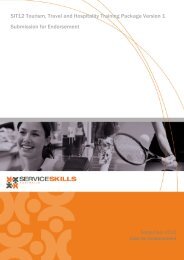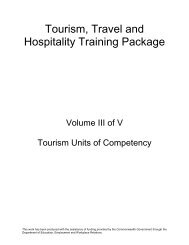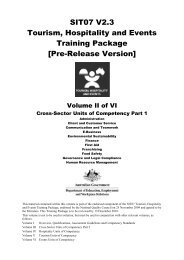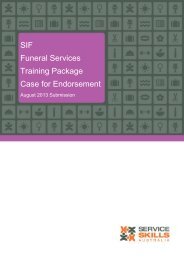Sustainability Skills Stocktake and Gap Analysis ... - Service Skills
Sustainability Skills Stocktake and Gap Analysis ... - Service Skills
Sustainability Skills Stocktake and Gap Analysis ... - Service Skills
Create successful ePaper yourself
Turn your PDF publications into a flip-book with our unique Google optimized e-Paper software.
<strong>Service</strong> <strong>Skills</strong> Australia<br />
About <strong>Service</strong> <strong>Skills</strong> Australia<br />
<strong>Service</strong> <strong>Skills</strong> Australia (SSA) is the Industry <strong>Skills</strong> Council for the service industries. <strong>Skills</strong><br />
councils are the recognised national bodies providing advice on industry training <strong>and</strong><br />
skills development needs to government <strong>and</strong> industry.<br />
<strong>Service</strong> <strong>Skills</strong> Australia represents the interests of businesses across sectors including<br />
retail <strong>and</strong> wholesale, sport, fitness, community recreation, outdoor recreation, tourism,<br />
meetings <strong>and</strong> events, hospitality, restaurants <strong>and</strong> catering, caravans, hairdressing,<br />
beauty, floristry, community pharmacy <strong>and</strong> funeral services.<br />
<strong>Service</strong> <strong>Skills</strong> Australia supports skills development for the service industries by:<br />
providing industry intelligence <strong>and</strong> advice to <strong>Skills</strong> Australia, government <strong>and</strong><br />
enterprises on workforce development <strong>and</strong> skills needs;<br />
actively supporting the development, implementation <strong>and</strong> continuous<br />
improvement of high quality training <strong>and</strong> workforce development products <strong>and</strong><br />
services, including training packages. SSA currently manages a total of 10<br />
industry training packages (soon to be integrated into 7);<br />
providing independent skills <strong>and</strong> training advice to enterprises, including<br />
matching identified training needs with appropriate training solutions; <strong>and</strong><br />
working with enterprises, employment service providers, training providers <strong>and</strong><br />
government to allocate training places.<br />
Introduction<br />
<strong>Sustainability</strong> <strong>Skills</strong> <strong>Stocktake</strong> <strong>and</strong> <strong>Gap</strong> <strong>Analysis</strong> Report<br />
‘No economic system is sustainable unless it accommodates the ecosystems on which it<br />
depends.’ 1 . The health of our ecosystem is becoming recognised as essential to the<br />
ultimate health of our societies <strong>and</strong> our economies.<br />
The link between social, economic <strong>and</strong> environmental health is becoming increasingly<br />
seen as an interdependent one, <strong>and</strong> a holistic view of all three elements, as a central<br />
requirement to achieving sustainability.<br />
Australia‟s ability to effectively transition to a sustainable, low carbon economy is<br />
dependent on its ability to integrate the skills <strong>and</strong> values required for sustainable<br />
outcomes at the core of workplace practices. This report provides an analysis of how <strong>and</strong><br />
where sustainability skills are incorporated into the <strong>Service</strong> <strong>Skills</strong> Australia training<br />
packages. It also identifies gaps that relate to the work requirements <strong>and</strong> achievement of<br />
sustainable outcomes, in order to direct further work in this area.<br />
Project parameters<br />
1 http://www.gp.org/platform/2004/economics.html<br />
2



